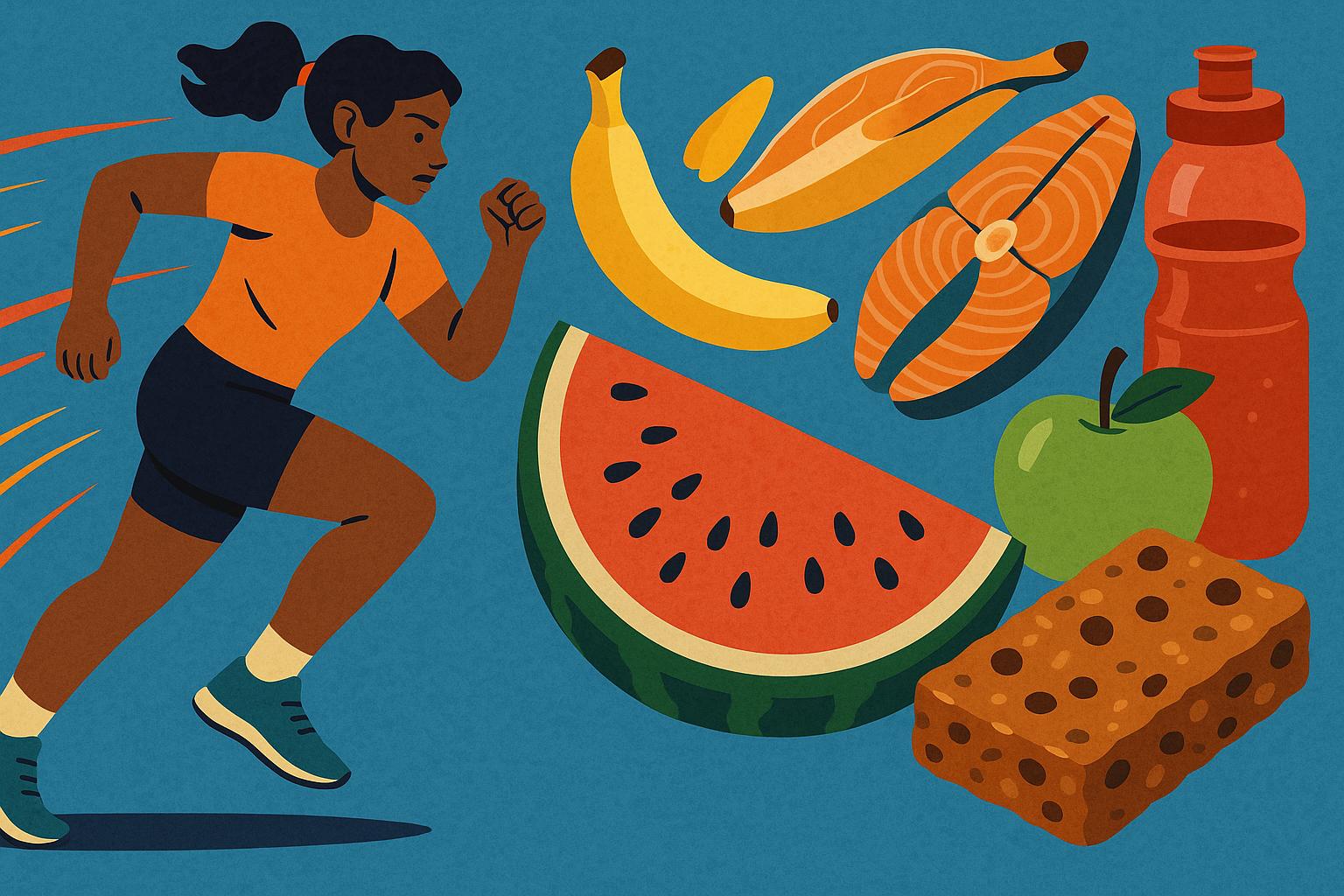Fueling Your Runs: Best Pre-Run and Post-Run Nutrition
Nutrition plays a pivotal role in how well you perform during your runs, impacting your energy levels, endurance, recovery, and overall success. Whether you’re preparing for a short sprint or a long-distance race, the food you consume before and after your run can make all the difference. Pre-run and post-run nutrition are crucial elements that can optimize your performance and help you reach your running goals faster.
In this article, we’ll explore the best strategies and foods to fuel your body before a run for maximum energy and stamina, and how to recover afterward to help your muscles rebuild and restore energy stores. Proper fueling isn’t just about improving performance; it also plays a vital role in preventing fatigue, injury, and burnout, ensuring you can continue to run longer, stronger, and healthier.
Pre-Run Nutrition: Setting the Stage for Success
The food you eat before a run sets the tone for your performance. Proper pre-run nutrition fuels your body with the energy it needs, ensuring you have the stamina to tackle your workout, whether it’s a sprint or a long run. Eating too little or eating the wrong foods can leave you feeling sluggish, while eating too much can cause discomfort and sluggishness. The key is finding a balance that works for your body and fueling your muscles with easily digestible nutrients that provide long-lasting energy.
Timing is Everything
One of the most important factors in pre-run nutrition is timing. You want to allow enough time for your body to digest the food you’ve eaten, but you don’t want to eat too early or too late before heading out for your run. Ideally, you should eat a small, easily digestible meal or snack about 30 to 60 minutes before your run. This allows your body to digest the food and start converting it into usable energy.
For some people, a smaller snack 30 minutes before a run may be sufficient, while others might prefer a more substantial meal an hour before their workout. It all depends on your personal preference and how your body responds to different foods.
Carbohydrates are Key
Carbohydrates are the body’s primary fuel source during exercise, especially for running. They are broken down into glucose and stored as glycogen in your muscles and liver. When you run, your body taps into these glycogen stores for energy. For this reason, consuming a carbohydrate-rich meal or snack before your run is essential for optimal performance.
Some great pre-run carbohydrate options include whole-grain toast, oatmeal, bananas, sweet potatoes, or fruit. These foods provide easily digestible carbs that are converted into glucose quickly, giving your body the energy it needs to power through the run.
Protein for Endurance
While carbohydrates are the main fuel source for running, a small amount of protein can also be beneficial, especially for longer runs. Protein helps with muscle repair and can prevent muscle breakdown during exercise, ensuring your body has the resources it needs to sustain the run.
A small portion of protein, such as Greek yogurt, a boiled egg, or a protein smoothie, can provide your muscles with the building blocks they need to endure the run. However, protein should not be the focus of your pre-run meal; keep it minimal and pair it with your carbohydrates to maintain a balanced energy supply.
Hydration: The Unsung Hero
Hydration is equally as important as food when preparing for a run. Dehydration can lead to fatigue, cramping, and decreased performance. Make sure to drink plenty of water before your run—aim for at least 16-20 ounces in the hour leading up to your workout. If you’re planning a particularly long or intense run, you may want to consider a drink that replenishes electrolytes, especially if you’ll be sweating heavily. Hydrating properly ensures that your muscles can work efficiently, keeping you energized and reducing the risk of injury.
Post-Run Nutrition: Rebuilding and Recovering
The work doesn’t stop once you cross the finish line—recovery is just as important as preparation. After your run, your body is depleted of glycogen stores, and your muscles have been subjected to wear and tear. Post-run nutrition helps replenish your energy stores, repair damaged muscles, and prevent muscle soreness, setting you up for success in your next workout.
Replenishing Glycogen Stores
Running, particularly long-distance running, depletes your body’s glycogen stores, which are the primary source of energy for endurance exercise. To speed up recovery, it’s essential to replenish these glycogen stores as soon as possible after your run. Consuming carbohydrates in your post-run meal is critical for this process.
Great sources of post-run carbs include fruits like oranges or berries, whole grains like quinoa or brown rice, and starchy vegetables like sweet potatoes. These foods help quickly replace the glycogen lost during your run, ensuring your body is fueled for the rest of the day.
Protein for Muscle Repair
Protein is essential after a run for muscle repair. Running puts a strain on your muscles, breaking down muscle fibers and causing minor tears. The body needs protein to repair and rebuild these muscles, ensuring that you recover and become stronger for future runs. Aim to consume a source of high-quality protein within 30 minutes to an hour after your run to maximize muscle repair.
Options like lean chicken, fish, eggs, Greek yogurt, or plant-based protein sources such as tofu and lentils can help your body rebuild muscle and prevent soreness. Aim for about 10-20 grams of protein in your post-run meal, depending on the intensity of your workout.
The Importance of Healthy Fats
While carbohydrates and protein take center stage in post-run nutrition, healthy fats also play a role. Fats support the absorption of vitamins and minerals, provide long-lasting energy, and help reduce inflammation. Avocados, nuts, seeds, and olive oil are all great sources of healthy fats that can support recovery while providing a satisfying meal.
Hydration: Refueling Fluids
Just as hydration is essential before a run, it’s equally important after a workout. Running causes fluid loss through sweat, and it’s important to replace lost fluids to maintain performance and speed up recovery. Drink water or an electrolyte-rich drink post-run to rehydrate and balance your body’s fluid levels. If you ran for over an hour or in hot conditions, a sports drink or coconut water can help replenish electrolytes like sodium, potassium, and magnesium.
Avoiding the Post-Run Pitfalls
After a run, it can be tempting to grab a sugary snack or indulge in comfort food. However, these foods provide little to no nutritional benefit and can leave you feeling sluggish later on. Instead, focus on nutrient-dense, whole foods that will support your body’s recovery and enhance your overall performance. Stay away from processed, high-sugar foods and choose meals that are rich in vitamins, minerals, and antioxidants.
Crafting Your Pre-Run and Post-Run Meal Plan
Creating a consistent pre-run and post-run nutrition plan can help you maximize your performance and recovery. Here’s a sample meal plan for a day of running:
Pre-Run Snack:
1 small banana with a tablespoon of almond butter
1 cup of water
Post-Run Meal:
Grilled chicken or tofu with quinoa and a side of steamed vegetables
A handful of nuts or a small avocado for healthy fats
1 glass of water or an electrolyte-rich drink
Snack Between Meals:
Greek yogurt with mixed berries and a sprinkle of chia seeds
Herbal tea or water to stay hydrated
Evening Meal:
Baked sweet potato with grilled salmon and a mixed green salad with olive oil dressing
Water or a light herbal beverage
By combining carbohydrates, protein, and healthy fats before and after your runs, you’ll ensure your body is properly fueled for peak performance and recovery.
Unlocking Your Full Running Potential: Fueling for Success
Nutrition isn’t just about food—it’s about fueling your body for success. By paying attention to your pre-run and post-run nutrition, you’re setting yourself up for a stronger, faster, and more resilient running routine. These nutritional strategies will help optimize your energy, prevent injuries, and enhance your recovery, ensuring you stay on track to meet your running goals.
Every run is an opportunity to grow stronger, and with the right nutritional approach, you can unlock your full potential. So, the next time you hit the pavement, remember that fueling your body with the right nutrients is just as important as the run itself. Keep nourishing yourself, stay consistent, and watch your running performance reach new heights.
Your Running Journey Starts Here
Mastering the art of pre-run and post-run nutrition is a journey that pays off in the long run—literally. Proper nutrition will allow you to run longer, recover faster, and stay energized throughout your workouts. Remember, it’s not just about fueling for today’s run—it’s about investing in tomorrow’s success. Keep refining your nutrition, keep challenging your body, and keep pushing toward your peak performance. The road to greatness starts with the right fuel—so fill up and run strong.




